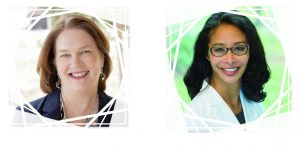A few years ago, Atikokan was a town in crisis having only one full-time and one half time family physician for a population of approximately 2,800. The community relied heavily on a rotation of locums to meet its health-care needs.
Today, the town has a stable physician workforce that is able to provide patient-centered care, continuity of care and, importantly, a supportive network for physicians. Dr. Shawn Minor is a graduate of the Northern Ontario School of Medicine (NOSM) MD Class of 2016 and completed his residency at University of British Columbia in 2018. Originally from Thunder Bay, Dr. Minor and his wife, with their young children, decided to return to Atikokan to be closer to their extended family.
“I was the fourth doctor to join the community,” says Dr. Minor. “There was a kind of snowball effect at that point. Some of the locums who had been part of the Atikokan rotating pool of locums started to see physicians signing up to start permanent practices in the community. I think that prompted a realization that they wouldn’t be able to rotate in and out indefinitely, and we had a number of physicians sign on within eight months.”
The town of Atikokan, located 200 km west of Thunder Bay, is well known to outdoor enthusiasts as one of the main access points into beautiful Quetico Provincial Park, the “Canoeing Capital of Canada.” The name Atikokan, is Ojibwa-Chippewa translated as ‘caribou bones’ or ‘caribou crossing.’
Dr. Minor says it’s an ideal place to practice, in part, because of the unique and innovative ways he is personally able to deliver care. “The thing I love most is being able to do home visits with my vulnerable older patients. I’ve done home visits by bicycle, by motorcycle, I’ve also walked to home visits during my lunch,” he says. “I’ve done portable ultrasound injections during home visits because the technology is so compact and the geography of the town is easy to navigate, allowing me to go in person. I can go to the hospital in the morning then bike to the clinic after, and I really enjoy this lifestyle and continuity of care. It’s amazing.”
He says patients also gain several advantages. The Atikokan physician community is close-knit and mutually supportive, leading to better care in ways that are not accessible in urban centres.
“My colleagues and I are in constant communication with one another. They can call me from the Emergency Department and I can do the same. I am able to access my clinic’s Electronic Medical Records (EMR) from the hospital and find information about a patient’s individual medical history really quickly—which was a source of frustration in an urban Emergency, where I frequently had no context or patient history to reference,” says Dr. Minor. “Likewise, I’ve had urgent calls from colleagues in Emergency asking if they should do resuscitation and I’m able to offer appropriate advice based on the patient’s wishes that were documented in the clinic. It truly allows for the most appropriate, patient-centred emergency care.”
Dr. Minor says it takes supportive physician leaders to build a community of practice that will sustain a physician and health-care workforce in a small Northern community. “Locums enjoyed rotating here because one of the long-term doctors was supportive. Anytime they came, they knew they’d have back-up and there was always help available in emergencies. That level of support is a huge factor in deciding to work full-time in a community,” Dr. Minor says.
“I think if physicians arrive in a place where they feel supported by the community and by the people who work there, they tend not to feel overwhelmed, they have better experiences, and they are able to find a good balance,” says Dr. Minor.
Some physicians continue to come and go, but four are in Atikokan to stay. “We have one doctor who commutes from Vancouver and another commutes from Toronto,” Dr. Minor explains. He describes the flexibility of scheduling as a strength. “It’s an interesting mix of people with different scheduling styles which works because we are supportive of each other and we are able to give one another enough flexibility to work in different ways. We are also fortunate to have a competent clinic manager to put it all together.”
Since NOSM’s inception in 2002, the School’s goal has been to graduate physicians and health-care professionals to meet the health needs across the region. With a total of 714 NOSM MD graduates to date, there is still a need for more than 300 family physicians and specialists in rural and remote Northern communities. Of this group, 126 family physicians are needed, with 86 of these needed in rural communities.
NOSM recently received a $210,000 donation from Derek Day from his late mother’s estate—the Estate of Ruth Day—to assist in transforming physician workforce planning in Northern Ontario. This generous donation will support the creation of a new Rural Generalist Pathway at NOSM.
The School recently launched its new strategic plan, The NOSM Challenge 2025.
Please consider joining The Challenge and donors like Derek Day who are making a difference in transforming health care in Northern Ontario. To make a difference, make your gift at nosm.ca/give.



